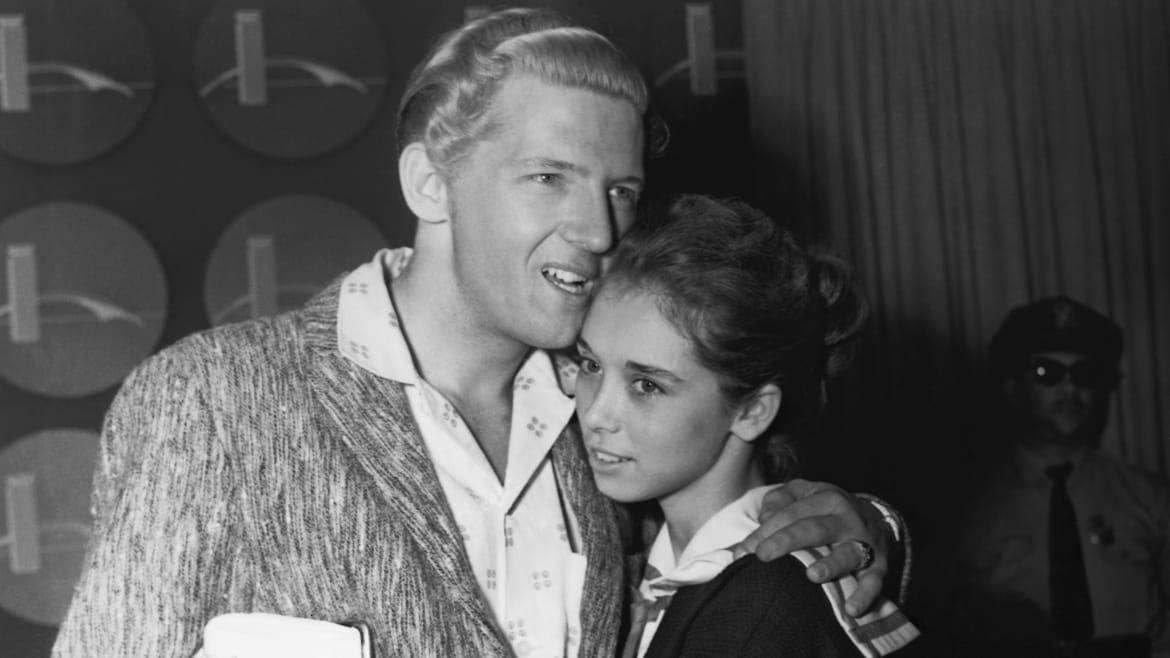Cannes’ Jerry Lee Lewis Documentary Avoids His Gross Pedophilia and Incest

- Oops!Something went wrong.Please try again later.
- Oops!Something went wrong.Please try again later.
What can even be said about Ethan Coen’s hilariously anonymous, cheerfully banal documentary about Jerry Lee Lewis? You’ve seen hundreds of these things screening on any TV channel at 8:30 pm on a Tuesday, prompting your grandfather to observe: “He was lively, wasn’t he? That Jerry Lee Lewis. What was the name of his song? Turn the sound up.”
Jerry Lee Lewis: Trouble in Mind is nominally “by” Ethan Coen, but readers are hereby defied—defied!—to find a single instance of the singular brother’s personal input. Sift through the endless archival footage of Jerry playing a rousing boogie-woogie on a variety show, or sitting sideways to his piano at home and reminiscing about Sun Records, or playing another slice of hair-raising boogie-woogie in concert, or reminiscing about his switch to country music, or playing some more boogie-woogie, and try to find the influence of the man behind half of The Big Lebowski. You can’t. There is a confounding lack of viewpoint on display here, in almost every scene: you could get the same effect from reading JLL’s Wikipedia and watching some clips on YouTube.
In ‘Holy Spider,’ a Serial Killer Murders Prostitutes in Iran—and the Country Supports Him
In fact, you might get a rather more complete picture of the artist if you took that tack, as Jerry Lee Lewis: Trouble In Mind is almost comically uninterested in sounding out the more difficult elements of Lewis’ life—such as his marriage to his 12-year-old cousin (which is briefly skirted over here, when it isn’t played for laughs) or his shooting of one of his back-up musicians, or his possible involvement in the death of one of his wives. The film doesn’t totally avoid the first two of these subjects—it couldn’t possibly—but the way they are dispatched is of the order of hagiography. Instead, the movie depicts Lewis as a charming, happy-go-lucky rebel—a narcissistic, lovable extrovert who loves to live life to the fullest. This may be partly true but is clearly far from the full picture, and the film’s inability to go further is frustrating.
What Trouble In Mind is left with is some strong archival footage, with several song performances shown in full: many of these scenes show Lewis’s magnetism as a performer, as well as his talent, as he sweetly tinkles the top ivories during a piano breakdown. He is shown to be almost as gifted at country and gospel (some of his vocal work is of a truly excellent quality) as he was at the electrifying brand of rock ‘n’ roll that made his name. But even the use of clips begins to traduce the film’s subject by the end: Lewis’s career, for all its length, has not been incredibly varied, and so an umpteenth video of him standing up at the keyboard and bashing the keys with his foot finally does his music a disservice, rendering it banal. What started out as an interesting glimpse into his musicianship becomes exhausting—a grueling marathon.
Likewise, Lewis himself, who on the evidence of his to-camera segments (none of them new, all recycled) seems to be an engaging character if you can look past, you know, the violence and pedophilia. Lewis’s megalomania appears charmingly candid to begin with, and Coen (or whoever shot these clips) teases out a few laughs from the singer’s artless assessment of his own abilities. But by the end of the show, it feels cloying to hear Lewis kvetch about how he could have been as big as Elvis, or played the piano better than his cousin, or has a god-given talent, or whatever formulation he may hit on to big himself up. The film does Lewis no favors by avoiding the knottier stuff (for instance, there would have been so much room to go into Lewis’s family background, which by all accounts is quite extraordinary, featuring dozens of uncles, aunts and cousins, many of whom were performers) in favor of these more facile musings.
Without the Ethan Coen imprimatur, Jerry Lee Lewis: Trouble In Mind would have the shelf-life of a snowflake in hell, but taken as a standard commission about a singular artist toward the end of a life lived to the full in all senses of the phrase, there are a few simple pleasures to be had here. Alternatively, the aforementioned hack of Wiki plus a two-minute YouTube search for “Great Balls of Fire” should do the trick.
Get the Daily Beast's biggest scoops and scandals delivered right to your inbox. Sign up now.
Stay informed and gain unlimited access to the Daily Beast's unmatched reporting. Subscribe now.

